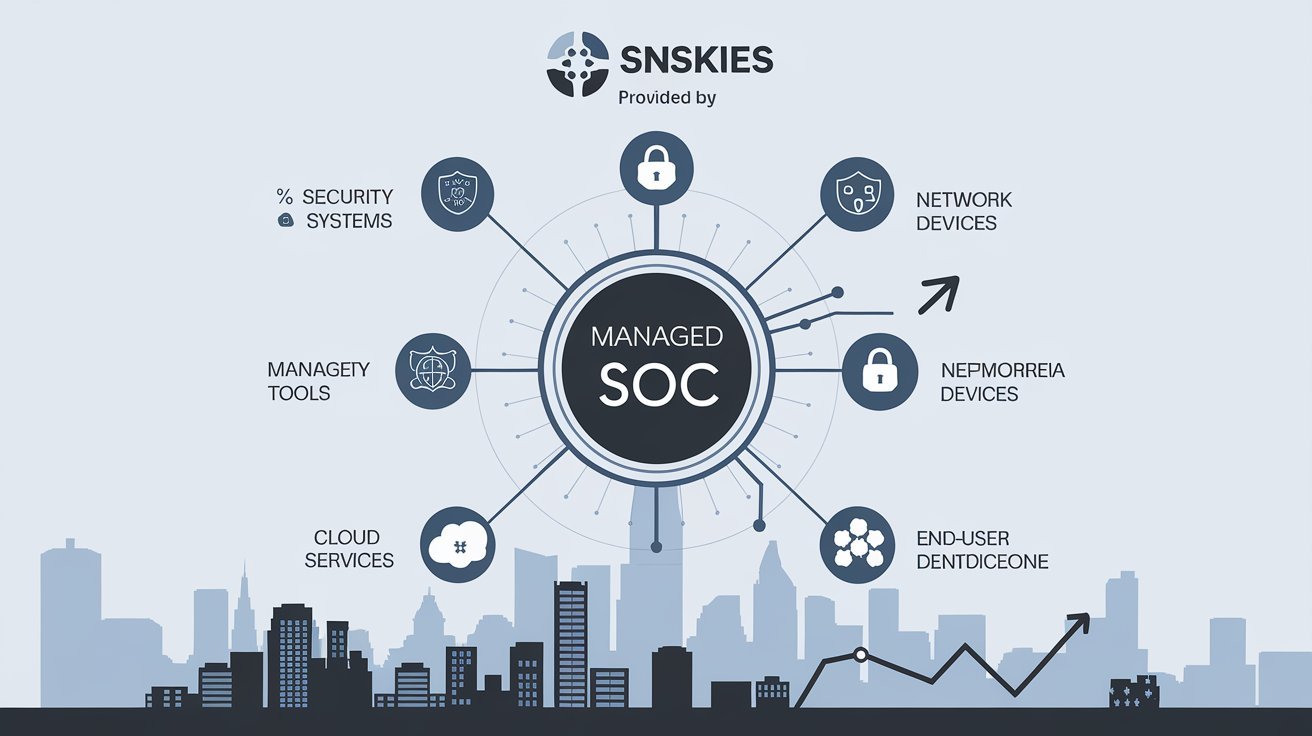
In today’s hyper-connected world, enterprises are more vulnerable than ever to sophisticated cyber threats. With the increasing reliance on digital platforms, remote work, and cloud services, the attack surface for cybercriminals has expanded significantly. To safeguard their assets, enterprises need a robust cybersecurity framework, and a Managed Security Operations Center (SOC) plays a crucial role in strengthening their defenses.
A Managed SOC is an outsourced solution that provides comprehensive, 24/7 security monitoring and incident response. It offers enterprises a centralized platform to detect, analyze, and mitigate cyber threats in real-time. In this blog, we’ll explore the key role of Managed SOCs in enhancing enterprise cybersecurity and the benefits they bring to organizations of all sizes.
Why Enterprises Need a Managed SOC
As cyberattacks become more frequent and complex, enterprises face the daunting task of defending their digital ecosystems from a variety of threats, including malware, ransomware, phishing, and insider attacks. Traditional security tools, such as firewalls and antivirus software, are no longer sufficient to protect against these evolving dangers.
Enterprises need a proactive approach that goes beyond basic security measures, and that’s where a Managed Security Operations Center comes in. By leveraging advanced technologies and a team of experienced cybersecurity professionals, Managed SOCs provide the following key benefits:
- Real-time Threat Detection: Continuous monitoring and threat detection allow enterprises to identify potential threats before they cause serious damage.
- Rapid Incident Response: A Managed SOC offers immediate response capabilities to contain and neutralize security incidents as soon as they are detected.
- Cost-effective Security: Building an in-house SOC can be expensive and resource-intensive. A Managed SOC provides access to top-tier security tools and expertise at a fraction of the cost.
Strengthening Threat Detection and Prevention
One of the primary functions of a Managed Security Operations Center is its ability to provide real-time threat detection and prevention. Managed SOCs use advanced technologies such as Security Information and Event Management (SIEM) systems, machine learning, and artificial intelligence to continuously monitor an enterprise’s IT environment.
By analyzing massive amounts of data from various sources—such as firewalls, servers, and user activities—these tools can detect suspicious patterns or anomalies that indicate a potential attack. Once a threat is identified, the SOC team can take immediate action to mitigate it, preventing data breaches, malware infections, and other security incidents.
For AI Articles: https://menproject.co.uk/category/ai/
For example, if a phishing attack is detected, the SOC can swiftly block malicious emails, isolate affected accounts, and alert the organization’s security teams. This rapid response capability is critical in minimizing the impact of cyber threats.
24/7 Monitoring for Continuous Protection
Cyberattacks can happen at any time, and enterprises can’t afford to leave their systems unmonitored, especially outside regular business hours. SNSKIES offers 24/7 monitoring, ensuring that potential threats are detected and addressed even during weekends, holidays, or late at night.
This around-the-clock surveillance is particularly important for large enterprises that operate in multiple time zones or have a global customer base. With a Managed SOC, organizations can rest assured that their networks are being watched continuously, with security teams ready to respond to any incident, no matter the time of day.
Expert Incident Response and Mitigation
When a cyberattack occurs, time is of the essence. Delayed responses can lead to catastrophic outcomes, such as data loss, system downtime, and reputational damage. A Managed SOC excels in providing rapid incident response and containment, ensuring that threats are addressed before they spread.
In the event of a security breach, the SOC team quickly investigates the root cause, determines the scope of the incident, and takes necessary steps to mitigate the impact. This might involve quarantining affected systems, blocking malicious traffic, or implementing a patch for a newly discovered vulnerability.
Additionally, a Managed SOC offers post-incident analysis to help organizations understand how the attack occurred and what steps can be taken to prevent similar incidents in the future. This process of continuous improvement strengthens an enterprise’s overall cybersecurity posture.
Threat Intelligence and Proactive Defense
Staying ahead of cybercriminals requires a proactive approach to cybersecurity. Managed Security Operations Centers are equipped with threat intelligence capabilities that provide valuable insights into emerging threats and vulnerabilities. This intelligence is gathered from a variety of sources, including global threat feeds, dark web monitoring, and industry-specific data.
By leveraging this intelligence, Managed SOCs can help enterprises anticipate potential attacks and strengthen their defenses accordingly. For example, if a new type of ransomware is identified in the wild, the SOC can implement specific countermeasures to protect the organization’s network before it becomes a target.
This proactive defense approach allows enterprises to stay one step ahead of cyber threats, rather than simply reacting to incidents after they occur.
Scalability to Meet Growing Cybersecurity Needs
As enterprises grow, so do their cybersecurity needs. A Managed SOC offers the scalability required to keep up with increasing volumes of data, users, and digital assets. Whether an organization is expanding into new markets, adopting new technologies, or onboarding new employees, a Managed SOC can adapt to meet the evolving demands of the business.
Unlike an in-house SOC, which may require significant investments in hardware, software, and personnel to scale, a Managed SOC can easily accommodate growth without adding complexity or cost. This flexibility allows enterprises to focus on their core operations while maintaining a robust cybersecurity framework.
Supporting Regulatory Compliance
For many enterprises, regulatory compliance is a key consideration when it comes to cybersecurity. Industries such as healthcare, finance, and retail are subject to strict regulations regarding data privacy and protection, such as GDPR, HIPAA, and PCI DSS.
A Managed Security Operations Center helps enterprises meet these regulatory requirements by providing continuous monitoring, detailed logging, and regular security audits. SOC teams ensure that the organization’s security protocols are aligned with industry standards, helping to avoid costly fines and legal repercussions.
Additionally, Managed SOCs provide compliance reporting, which can be used to demonstrate adherence to regulatory guidelines during audits or inspections. This reduces the burden on internal teams while ensuring that the enterprise remains compliant with relevant regulations.
Managed SOC as a Strategic Partner for Cybersecurity
A Managed Security Operations Center is not just a service provider—it’s a strategic partner in enhancing enterprise cybersecurity. By integrating with an organization’s existing IT infrastructure, the SOC team collaborates with internal security personnel to provide comprehensive protection across all systems, networks, and endpoints.
This partnership ensures that the organization has access to the latest cybersecurity tools and expertise, allowing them to defend against even the most sophisticated threats. With the support of a Managed SOC, enterprises can focus on their business goals without compromising their security.
Conclusion
In an age where cyber threats are becoming more frequent and complex, enterprises need a robust solution to protect their digital assets. A Managed Security Operations Center (SOC) offers real-time threat detection, rapid incident response, and proactive defense, making it an essential component of any enterprise’s cybersecurity strategy.
By providing 24/7 monitoring, expert analysis, and scalability, a Managed SOC strengthens an enterprise’s ability to defend against cyberattacks, minimize risks, and ensure regulatory compliance. Investing in a Managed Security Operations Center is not just a way to enhance cybersecurity—it’s a strategic move that allows enterprises to operate with confidence in today’s digital landscape.






